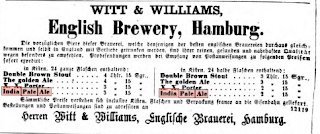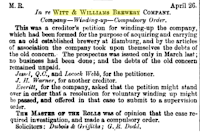My search term this time was "India Pale Ale" and given that I was searching again in the Austrian National Library's newspaper archive, I wasn't really expecting much. Indeed, I only got 21 results and none of them from the brewing focused periodicals, "Der Böhmischer Bierbrauer" and "Gambrinus Brauer und Hopfen Zeitung". Of those results, 2 stood out.
The first was an advert for a delicatessen on the famous Getreidegasse, birthplace of Mozart, in Salzburg from 1866, which I tweeted about the other day. If you fancied some porter or IPA in the middle of the 19th century in Salzburg, just visit A. Florinek and get your fill
The other was from June 1869 in "Illustrirte Zeitung" from Leipzig and was an advert for a brewery in Hamburg.
With a little further digging, yay Google, I discovered that Witt & Williams English Brewery was established in 1869 and wound up in 1871. The advert above contains the usual marketing waffled of the day, claiming:
"The excellent beers of this brewery, which are on a par with those of the best English breweries and are a favourite drink even in England, are particularly recommended because of their pure, healthy, and nutritious quality."
The ad goes on to inform us that samples are available from the brewery, just write to them with postal instructions and the relevant cash for a case of either 24 full sized bottles or 24 half bottles. 4 thaler 15 silbergroschen, approximately 12 Shillings 7 pence in old British money, or, if I have done the various sums correctly, about £60 in modern British money ($80/€73) would purloin for you a case of either "Double Brown Stout" or "The golden Ale", while 3 thaler 15 silbergroschen (do your own maths, my head hurts) would get you the XX Porter or IPA.
Assuming that the beers on offer were truly "on a par" with those being brewed in England, the Double Brown Stout would have had a starting gravity around 1.072, the XX Porter 1.061, IPA 1.066, and the golden ale I am assuming based on it being priced at the same as the Double Brown Stout, probably somewhere in the 1.070 ballpark. Major shout out here to Ron's European Beer Guide site for huge amounts of data that back up my assumptions about strength.
Given Hamburg is one of the most Anglophile cities in Germany, and had a long history of trade with England, there is a recorded English community in Hamburg from the 1600s that led to the establishment of the English church dedicated to St Thomas a Beckett, you would have expected these brews to find a ready and willing audience, yet 2 years later the brewery was wound up. What happened?
It turns out that messrs Witt and Williams had started their business in 1869 with a view to purchasing an existing brewery in Hamburg, and continuing the business. According to the articles of association Witt & Williams Brewery Company also took on the brewery's existing debt. Between the establishing of the company and April 26th 1871 when the Master of the Rolls issued a compulsory order for the winding up of the company, it would seem "no business had been done" and the debts that Witt & Williams had assumed "remained unpaid", and the creditors came calling. Below is the case as described in "The Weekly Notes".
A reminder perhaps that success is not guaranteed in brewing and that since time immemorial breweries have come and gone, been bought, sold, and liquidated, subject to the same rules of business as any other corporation, regardless of status. Brewing is, at the end of the day, just that, a business, not a faith, not a movement, not a lifestyle, not an indicator of being a "good person", not even a calling to some higher virtue.
What happened to messrs Witt and Williams after their business venture in the North German Confederation came to such an unfruitful end? I don't know, perhaps they moved on to some other money making scheme, whether in booze or not. I wonder if they ever got to send a case of samples...
UPDATE: It seems that the Witt bit of this brewery may have been German. From the Hamburg State Archive, I have found that his full name was August Wilhelm Witt, and there were complaints against his brewery, which was located at Neustrasse 46 in the Hohenfelde area, for smoke nuisance.
Second Update: I had made a mistake in my maths that I corrected.







No comments:
Post a Comment